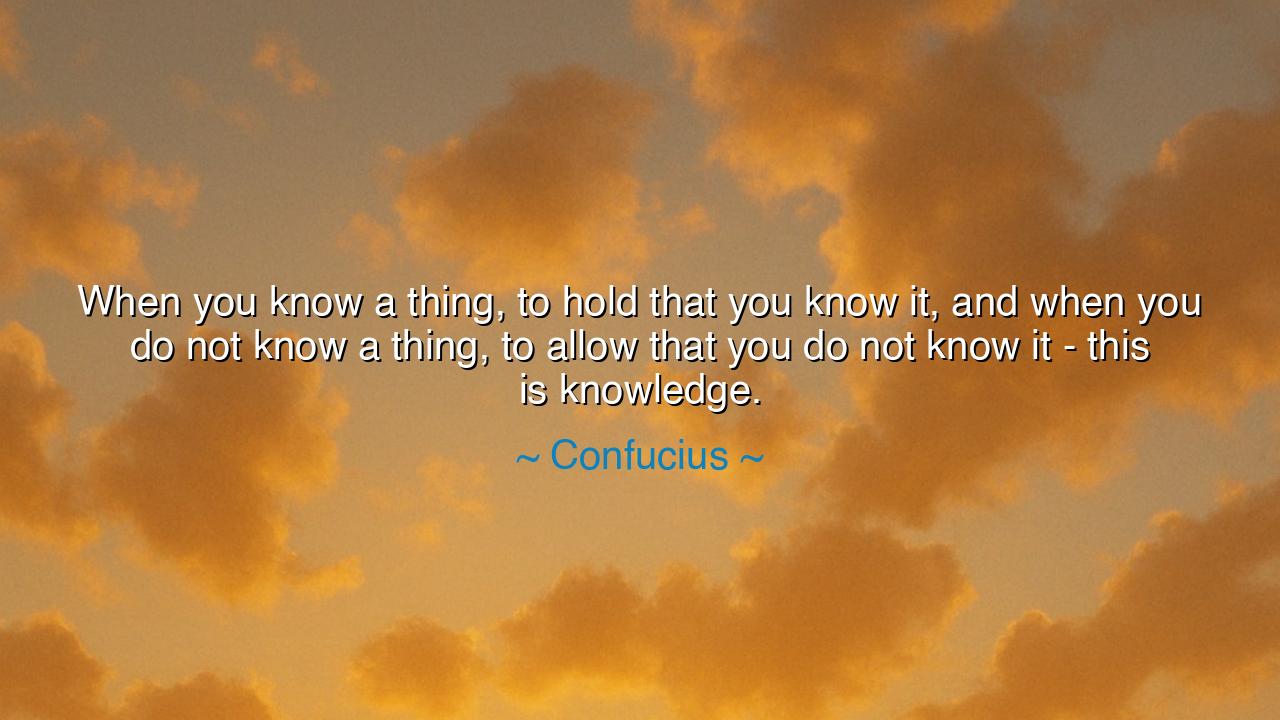
When you know a thing, to hold that you know it, and when you do
When you know a thing, to hold that you know it, and when you do not know a thing, to allow that you do not know it - this is knowledge.






Hear the immortal words of Confucius, the great teacher of the East, who declared: “When you know a thing, to hold that you know it, and when you do not know a thing, to allow that you do not know it—this is knowledge.” In this saying lies a wisdom deep as the ocean and clear as the mountain spring. For the essence of true knowledge is not in the piling up of answers, nor in the boasting of wisdom, but in the balance of honesty and humility. To claim what one knows, and to confess what one does not, is to walk the path of truth.
The ancients taught that ignorance is not in “not knowing,” but in “pretending to know.” A man who admits his lack can still learn, but the man who masks ignorance with pride closes the door to wisdom. The first is a traveler upon the road; the second is one who sits in the dust, imagining he has arrived. Thus Confucius, in his gentle but powerful way, reminds us that the root of wisdom is sincerity, and the highest strength is to be unafraid of the words, “I do not know.”
History is filled with examples of this truth. Consider the life of Socrates, the philosopher of Athens, who declared himself wise only because he knew that he knew nothing. He stood against the arrogance of men who claimed to hold all answers, exposing them through questioning, showing that to claim false certainty is to live in blindness. Though different in land and language, Socrates and Confucius echo one another across time: both knew that true knowledge is less about possession and more about the integrity of one’s search.
Yet let us not mistake humility for weakness. To say “I do not know” is not to lower oneself, but to open the vessel for filling. The farmer who admits his soil is poor may seek to enrich it; the leader who confesses his limits may call upon wiser counsel. But the one who insists on false wisdom is like a vessel already sealed—no water may enter, no growth may come. To confess ignorance is the first act of courage, the beginning of learning, and the mark of a soul ready to rise.
This principle is not only for sages and rulers, but for all who live. Think of the scientist Marie Curie, who probed the mysteries of radiation. She did not begin with answers; she began with questions, with the courage to say, “We do not yet understand.” It was her willingness to admit what was unknown that led her to discovery, and her humility before truth that made her great. By following the path of Confucius, she showed that knowledge is born not from pride, but from inquiry, persistence, and honesty.
The lesson, then, is clear: speak what you know, and admit what you do not. Let your words be anchored in truth, not vanity. In conversation, do not fear silence; in study, do not fear questions. For the one who guards honesty in both knowing and unknowing walks the straight path of wisdom. To live otherwise is to wander in circles, always speaking but never learning, always boasting but never growing.
Therefore, let this be your practice: when you know, stand firm and share it with confidence, that others may be guided. When you do not know, speak with humility, that others may teach you. In this balance you will grow, and in your growth you will inspire. For as Confucius taught, this is the true essence of knowledge: not the pride of possessing all things, but the courage to live sincerely between certainty and mystery.






AAdministratorAdministrator
Welcome, honored guests. Please leave a comment, we will respond soon